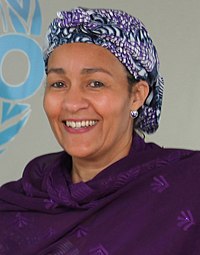The life of an average woman elicits some kind of sympathy
from me. I'm sorry for using the word "sympathy" which sounds rather
derogatory.
Every woman lives her life in some forms of natural pains.
Every maltreatment meted on her in the society only compounds these pains.
After birth, the girl child undergoes genital mutilation
(now being prohibited in the society) At school age, she is considered to
"belong to the kitchen and the other room." She is denied western
education which automatically goes to her sibling - the boy.
At puberty, she experiences pains as her body grows into
adulthood. She groans at every menstrual period, and the boy even makes jest of
her.
Many girls who are denied education are soon handed over to
waiting suitors in marriage. The girl child begins her journey into life of
possible misery. She may not have a voice in family's decision, she gives birth
as her husband desires, lives her life in abject poverty and in avoidable
sickness. Her lifespan is cut short. She dies too soon and leaves behind
children who may be without a good future.
For girls who are lucky to be in school, they eventually get
married and have their share in the pains.
The woman becomes pregnant and falls sick. She carries her
fetus for nine months and is delivered of her baby in great pains. Let me
explain this further. The day I began to respect my wife and every woman the
more was the day my baby was born. I was there in the labour room. I used my
position as President of Association of Nigeria Health Journalists to plead
with doctors and nurses that attended to her to see her in the room twice)
Only hell fire could produce more agonizing experience. And,
I concluded, as I believe till date, and till I will die, that no man can face
or endure pain like a woman.
The woman gives birth to her baby, she nurses the baby for
two years of mostly sleepless nights. She doesn't sleep until the baby sleeps.
She endures, even when there is nothing to eat, nor money to spend. Instead of
nagging over these, she becomes prayer warrior and goes into fasting, even when
breastfeeding!
There is one more important thing I want to say. Imagine a
woman, she attends to her children in the house, she does most part or all the
house chores, she works to support the home expenditures. After all the day's
stress, the husband will still sleep with her at night. He will expect that he
must satisfy himself, with all the stress the woman has gone through in the
day.
What more will I say? I remember the time my was sick when
he was bringing out teeth, my wife (and my sister) came out of the house at
1:00am to look for the baby's medication far away from the house. That is
typical of an average woman.
Can you remember the roles women play whenever anyone is
sick in the house or workplace?
Our society gives glory of what happens in families to men
and the opposite goes to women.
Despite all these, imagine how our women endure marriage.
Many men are not even ready to settle down with any woman. Some see women as
necessary evil. Consequently, most ladies are out there begging God to give
them a home. I even heard someone yesterday tell his wife whom he has refused to
feed with her children to leave his house. He told the wife: "There are
hundreds of you waiting at the door, praying that you leave so they could come
in." Judgment belongs to God, hope you remember?
I have often made this argument that no matter how bad or
wicked a woman could be to man, she was probably taught to behave that way by a
man. That is, she is wicked because a man had been wicked to her.
I quite understand that some women could be irresponsible,
but from my experiences, men are much more guilty in issues which arise from
how both men and women deal with each other.
I call on all men to respect and honour the female folks -
women and girls. They deserve to be respected and cared for. Remember, we shall
all give account of our deeds before God at the end.
*Contributed by Marcus Fatunmole
... Linking agrobiz, sustainable environs, people & technology
Pix: Mrs Aisha Buhari and Mrs. Osinbajo



















